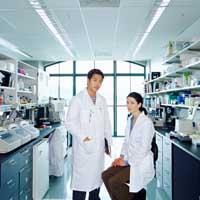Applied Science qualifications show promise of broadening the appeal and take up of science within the 14-19 sector. However, a report published by the Nuffield Foundation warns that a lack of clarity on the future of these courses at post-16 level could undermine their potential to achieving this goal.
In July the Nuffield Foundation published An invisible revolution? Applied Science in the 14-19 curriculum, a review of the Applied Science provision which has developed in recent years in England. Produced by Jim Donnelly, professor of science education at Leeds University, the report highlights the continued growth and success of vocational science courses and identifies issues to be addressed.

14-19 Applied Science
Applied Science qualifications present science in the context of the world of work. In comparison to more traditional science qualifications these courses involve a reduced emphasis on substantive scientific knowledge but have a greater emphasis on student practical work, student independent activity (eg research and report writing) and the use of portfolios for formal, summative assessment. This distinctive approach provides a motivating form of science education for students who have attained less highly at the preceding Key Stage, enabling these students to reach higher levels of attainment than would be the case if they followed traditional courses.
In England, provision of Applied Science qualifications for 14-19-year olds gained momentum in 2002 with the introduction of GCSE double award Applied Science. Since then Applied Science provision at levels two and three of the National Qualification Framework (NQF) has seen several changes. Current applied options offered at level two alongside GCSE double award Applied Science include single award additional applied GCSEs, such as the Twenty-first century science option introduced in 2006, BTEC Firsts and OCR Nationals. Progression at level three is via either A-level Applied Science or BTEC Nationals.
Donnelly reports that the success of these qualifications over the past seven years is such that in 2008 around 110,000 students (nearly 15 per cent of the student cohort in England) gained an Applied Science qualification at NQF level two. On top of this, in 2008 A-level Applied Science attracted an AS entry (combining single and double award) of some 3000 students.
The growing cohort of students taking Applied Science at KS4 could have an important role to play in meeting ambitious targets set by the national STEM programme for increasing the number of young people entering scientific and technological training. To fulfil this promise there needs to be suitable provision at level three for these students to continue their applied learning of science post-16. However, despite its initial success A-level Applied Science does not appear to be an ideal option for these students.
Applied learning at A-level
Introduced in 2005, GCE A-level Applied Science was seen as a step towards the elusive 'parity of esteem' with other academic qualifications historically sought by vocational qualifications. However, this status required compromises in the traditional design and assessment of a course with an applied learning focus, eg the inclusion of examined elements. According to Donnelly, anecdotal evidence suggests that some schools and sixthform colleges identify the BTEC Nationals as a better replacement for Advanced GNVQ than the A-level Applied Science in its present form. This is because some teachers see the A2-level examined component of the A-level as posing a major hurdle to the students who are encouraged to follow this vocational route within post-16 science.
Angela Hall, director of the Nuffield Foundation Curriculum Programme, told Education in Chemistry, 'The current Applied Science A-level has weaknesses as a progression route for students moving on from KS4 courses such as Twenty-first century science additional applied GCSE. The range of activities and methods of assessment used are limited compared to those the students experience at KS4. The course also needs revision to make it engage better with current workplace practice'. However, now the Science Diploma is in development, A-level Applied Science is destined to terminate in 2013.
Following the Government's decision in April to delay the introduction of the Science Diploma at the advanced level by one year to 2012 based on concerns aired by the scientific community1, the Nuffield Foundation has now commented on the development of the new qualification. According to Hall, there is the potential for a route within the Science Diploma for students moving on from applied courses at KS4. 'The additional and specialist learning components could be used to enhance the applied flavour of the advanced diploma'.
'Models for the Science Diploma will be presented to the Government at the end of September', says Hall. 'Hopefully then we will have a model within which to develop a clear progression route for Applied Science students'.
Related Links
One of the UK's best known charitable trusts which was established in 1943 by William Morris (Lord Nuffield)
References
- Educ. Chem. 2009, 46 (3), 66







No comments yet